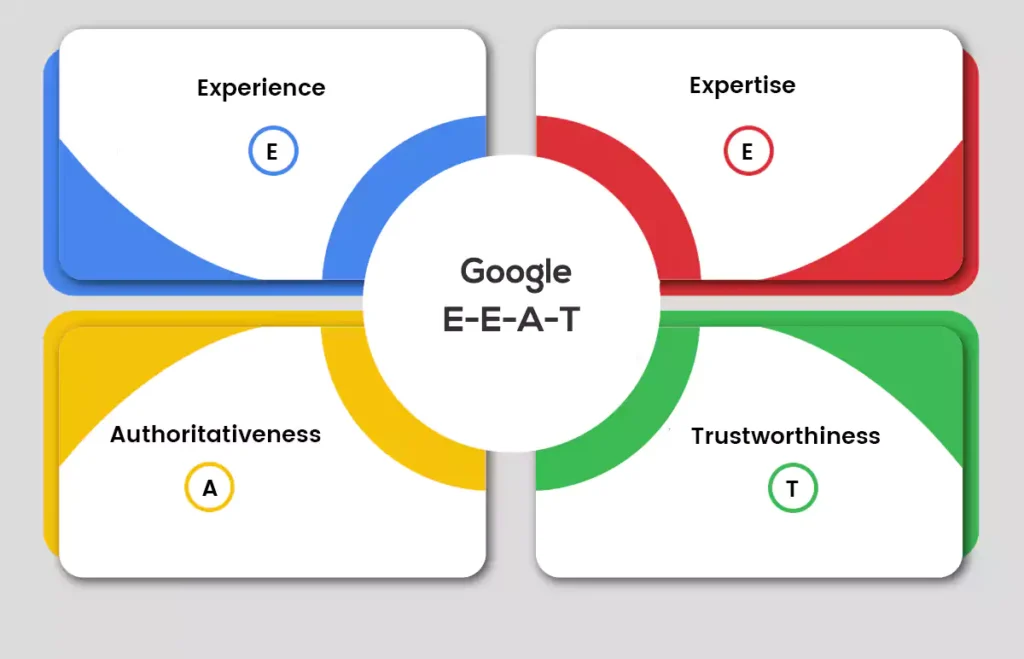Table of Contents
Let’s be honest—SEO often feels like trying to solve a puzzle with missing pieces. One day you’re on Page 1, the next you’re buried. But if there’s one thing Google has made crystal clear, it’s this: trust matters. That’s where E-E-A-T in SEO comes in.
It’s not some trendy buzzword—it’s a powerful set of signals that helps Google figure out if your content is worth showing to people. And if you get it right, it can completely change how your site performs.
Let’s walk through what E-E-A-T in SEO really means, why it matters so much now, and how you can start using it to your advantage—even if you’re not an “expert” yet.
What Exactly Is E-E-A-T in SEO?
E-E-A-T stands for:
- Experience
- Expertise
- Authoritativeness
- Trustworthiness
It’s Google’s way of asking:
“Can we trust this content?”
“Did someone with real knowledge actually write this?”
“Is this helpful and safe to share with users?”
If you want to show up in Google search—especially for serious stuff like health, finance, or anything that affects real lives—E-E-A-T in SEO needs to be baked into everything you do.
Why E-E-A-T in SEO Is a Big Deal (Even for Small Websites)
You don’t have to be a doctor, lawyer, or Fortune 500 company to benefit from E-E-A-T in SEO. Whether you’re running a blog, selling products, or offering a service, building trust with both your audience and Google is everything.
Here’s why it matters:
- It helps you rank better in search results.
- It makes your content more believable.
- It keeps users on your site longer.
- It gives you an edge over competitors who are just publishing fluff.
Bottom line? If you create content that feels real, honest, and helpful, E-E-A-T in SEO is working in your favor.
Breaking Down E-E-A-T in SEO (with Real Talk)
Let’s unpack each part—no jargon, just real-world examples.
Experience
This is the “been there, done that” factor. Have you actually tried what you’re writing about? Google wants content created by people who know what something feels like—not just someone copying info from other sites.
Example: A mom sharing her tips on potty training based on her own journey has more “experience” than an AI summary of 10 articles.
Expertise
This one’s about knowledge. Do you actually know your stuff when it comes to this? But don’t worry—it doesn’t always mean formal degrees. Years of hands-on experience, research, or learning by doing all count.
Example: A fitness coach sharing meal prep tips? Expert. A random freelancer writing the same blog without any background? Not so much.
Authoritativeness
Are people listening to you? Linking to you? Quoting your advice? That’s authority. It grows over time—but every share, backlink, and positive review adds up.
Tip: Guest blogging and being mentioned by others in your field is a great way to build this part of E-E-A-T in SEO.
Trustworthiness
This one’s the dealbreaker. If your site looks sketchy, hides who’s behind it, or has misleading info—Google (and users) won’t stick around. Be open, honest, and helpful.
Pro tip: Make sure your site has an “About” page, contact info, and clear privacy policies. That stuff actually matters.
How to Boost Your E-E-A-T in SEO (No Fancy Tools Needed)
You don’t need to be an SEO guru to get this right. Here are some easy ways to boost your E-E-A-T game.
Add Author Bios
Tell people who’s behind the content. A short bio with your background, credentials, or even your story builds credibility fast.
Share Your Experience
Talk about what you did, saw, or learned. Add photos, real results, or lessons learned. The more personal and relatable, the better for E-E-A-T in SEO.
Link to Trusted Sources
Don’t guess—back up your info. Linking to trusted sites (like WebMD, government pages, or legit news outlets) helps build trust.
Ask for Reviews or Testimonials
If people have good things to say about you, show it off. Social proof is a strong trust signal—not just for users, but for search engines too.
Keep Your Content Updated
Nothing kills trust like outdated info. Set a reminder to review your top posts every few months. Update your stats, clean up broken links, and make your content easier to read.
How Google Actually Uses E-E-A-T in SEO
Google has something called Quality Raters—real humans who evaluate search results using E-E-A-T guidelines. Their feedback helps train Google’s algorithms.
So no, E-E-A-T isn’t a “ranking factor” in the traditional sense—but it shapes how your content is seen and ranked behind the scenes. And the stronger your E-E-A-T in SEO, the safer your content is from algorithm updates.
Real-Life Examples of E-E-A-T in Action
Here’s how E-E-A-T shows up in different niches:
Health
A blog about mental health, written by a therapist who includes case studies and links to research—high E-E-A-T.
Finance
An article about saving for retirement written by a certified financial planner, updated with 2025 tax info—high E-E-A-T.
Travel
A guide to Bali written by someone who’s actually been there, with personal photos and local tips—yep, you guessed it: high E-E-A-T.
Final Thoughts: Build Content That Deserves to Be Trusted
If you’ve made it this far, here’s the one thing I want you to remember:
E-E-A-T in SEO isn’t about beating the algorithm—it’s about helping real people.
When you create content that’s honest, useful, and backed by real knowledge or experience, you’re doing more than just SEO. You’re building something that matters. Google sees that. So do your readers.
Whether you’re starting a blog, running a business, or building your brand—make E-E-A-T in SEO part of your content game. And trust me, you’ll stand out in a sea of generic content.

